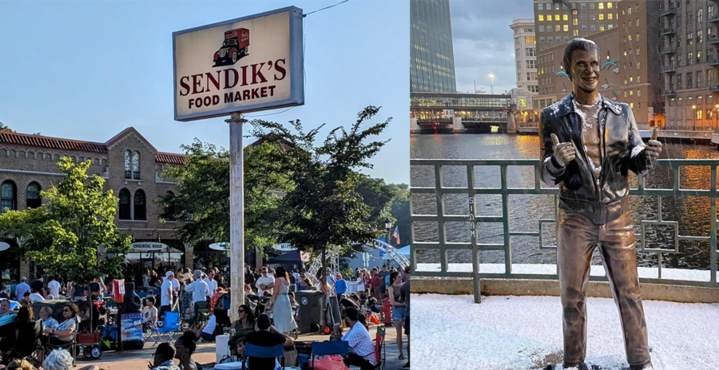Commentary: Urban vs. suburban is the new civil war
By: Steve Schuster, [email protected]//January 5, 2024//
Commentary: Urban vs. suburban is the new civil war
By: Steve Schuster, [email protected]//January 5, 2024//
It’s no secret that a new civil war has been brewing in this nation since 1865 post-Civil War reconstruction.
Scrolling through my social media newsfeed these days is like being on a digital battlefield: You never know what to expect but you know there will be divisiveness and shots fired.
While there is so much greatness in our country and in the world, if you focus on news headlines as of late, the evening news does not make it difficult to lose faith in man/womankind.
In some ways, the biggest threat to our Republic is not foreign, it’s domestic.
We may live in the best country in the world, but our nation is in a great state of disrepair.
In many ways our nation is more divided now than it was back in 1861 on the brink of the war between the states.
The current battlefield is not the North vs. South any longer — it’s rural and suburban vs. urban.
So what is the issue between suburban and rural vs. urban?
According to Pew Research, urban areas are typically populated with those who share liberal views and rural areas are typically populated with those who share conservative views. Historically, the suburbs are a mixture of both liberal and conservatives, thus being on the front of line of the urban rural divide.
There are vast differences in crime rates, poverty and diversity in rural vs. urban areas.
Last summer, Nicole Waldner, assistant chief of the Milwaukee Police Department, and other community leaders tore into the news media for falsely portraying Milwaukee as “a dangerous city.”
As previously reported by the Wisconsin Law Journal, community leaders pointed out opportunities for improvement with local media coverage, including not over sensationalizing stories for the purpose of more viewers or readers, not taking things out of context, and minimizing harm when it comes to unjustly damaging reputation of the city of Milwaukee.
For example, officials pointed out how when a Germantown man was killed in Milwaukee, the way the media coverage presented the news it just fed the false stigma and false stereotypes of how Milwaukee is dangerous for suburban or rural visitors.
“When I see things in the news ‘Germantown man killed on 95th and Silver Spring’ I was like what that does to everybody outside of Milwaukee. Oh my God, Germantown people don’t come to Milwaukee, it’s dangerous. Why was a Germantown man on 95th and Silver Spring?” Waldner said.
“It says to the people who don’t live in our city, and don’t know our city, that it’s dangerous. It’s not dangerous, if you don’t go to 95th and Silver Spring looking for something you shouldn’t have,” she said.
“There is so much going on here and people only get their information from the news. It makes us look a lot worse than we really are,” Waldner added.
Many of our elected officials and some of the news media are a part of the problem, not the solution.
Comments over the summer from elected officials such Sen. Latonya Johnson saying, “F-ck the suburbs because they don’t know a goddam thing about life is in the city,” add fuel to the fire of the already flaming rural vs. suburban divide.
Milwaukee Mayor Johnson recently made headlines for a comment (taken out of context by some media): “If folks are looking at a high-quality dinner or a theater or a fine dining experience, they can come here, or go to Cracker Barrel there.” The dig at the suburbs was the Milwaukee’s mayor response to Washington County official’s digs over sales tax increases.
Johnson’s Cracker Barrel comment was not only unproductive, but it takes away from the good work he and his administration have accomplished.
Having lived in rural northeastern Wisconsin, the North Shore of Milwaukee and in Baltimore City, I’ve experienced urban, rural, and suburban living.
I’ve found that all three experiences, like anything else in life, come with pros and cons. After talking with Wisconsinites of all political and social-economic backgrounds, I’ve learned a valuable lesson: We all love our state and our country in our own respective ways.
As election ads will soon be back on our television screens and social media feeds, let’s never forget — there will always be more that unites us than divides us.
Imagine what living in Wisconsin would be like if we were able to put aside our political differences as Wisconsinites and focus on the issues we all share in common.
I commend those officials who put aside partisan differences to work for the greater good of our state and our nation.
I’ve said it before, and I’ll say it again: Let’s make Wisconsin great again by focusing on what unites us.
Like … the Green Bay Packers and those Spring and Summer tailgate parties before a Brewers’ game, State Fair, Summerfest, the Milwaukee Bucks, traveling and exploring Wisconsin from the Apostle Islands to Door County and from Lake Geneva to the Wisconsin Dells. From the hills of the Kettle Moraine to the shores of Lake Superior, our beer, our cheese, our butter burgers, our frozen custard, our state pride unites us.
Let Wisconsin once again be a model for the rest of the country to show the world that we can work together despite our differences.
Never forget what unites us.
Legal News
- Newly filed report with federal court seeks Havana Syndrome transparency
- Questions of transparency, leadership responsibility linger over State Bar trust
- Firm demands $4.3M in dispute with Wisconsin client
- Chesebro among those charged with interfering in 2020 election
- Williams-Sonoma must pay almost $3.2 million for violating FTC’s ‘Made in USA’ order
- Harvey Weinstein due back in court, while a key witness weighs whether to testify at a retrial
- Protests erupt on college campuses throughout Midwest, and U.S. over war in Gaza
- Flight attendant indicted in attempt to record minor in airplane bathroom
- Wisconsin attorney loses law license, ordered to pay $16K fine
- Former Wisconsin police officer charged with 5 bestiality felony counts
- Judge reject’s Trump’s bid for a new trial in $83.3 million E. Jean Carroll defamation case
- Dozens of deaths reveal risks of injecting sedatives into people restrained by police
WLJ People
- Power 30 Personal Injury Attorneys – Russell Nicolet
- Power 30 Personal Injury Attorneys – Benjamin Nicolet
- Power 30 Personal Injury Attorneys – Dustin T. Woehl
- Power 30 Personal Injury Attorneys – Katherine Metzger
- Power 30 Personal Injury Attorneys – Joseph Ryan
- Power 30 Personal Injury Attorneys – James M. Ryan
- Power 30 Personal Injury Attorneys – Dana Wachs
- Power 30 Personal Injury Attorneys – Mark L. Thomsen
- Power 30 Personal Injury Attorneys – Matthew Lein
- Power 30 Personal Injury Attorneys – Jeffrey A. Pitman
- Power 30 Personal Injury Attorneys – William Pemberton
- Power 30 Personal Injury Attorneys – Howard S. Sicula












